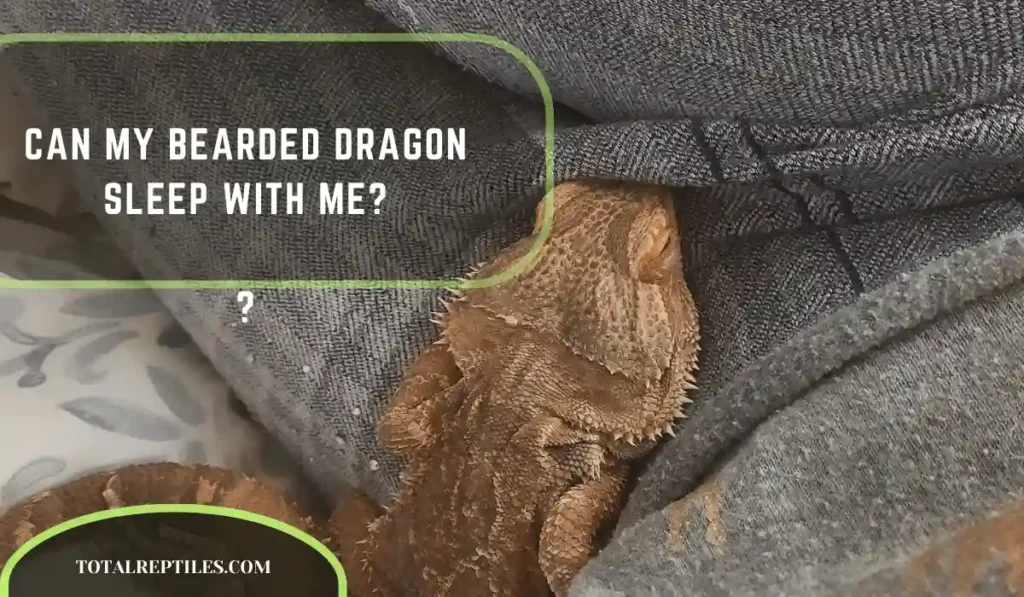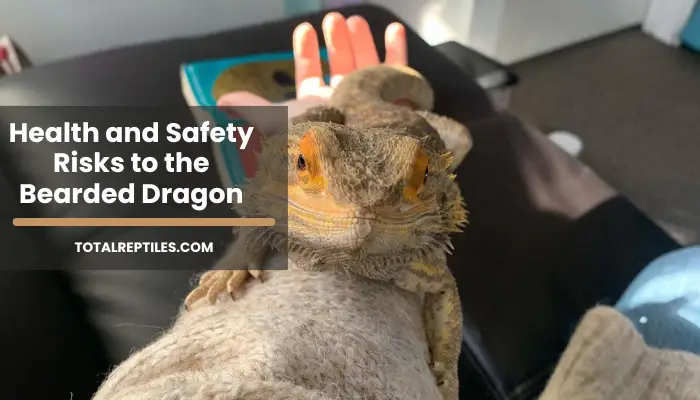The answer is sadly no. Nighttime cuddling with your bearded dragon is enticing yet dangerous. Sharing a bed can cause problems like temperature regulation, crushing and fall accidents, and circadian rhythm disruptions.
Do you ever wish your bearded dragon could sleep snuggled up beside you at night? Who wouldn’t want to drift off curled up with their scaly pet? But is it safe and healthy for your beardie to sleep in bed?
Relax your scaly companion in their tank or habitat with an uninterrupted beauty nap. Join me to explore this important topic for all bearded dragon owners!

Potential Benefits of Co-sleeping with a Bearded Dragon
Who wouldn’t want to drift off to dreamland with their scaly sidekick snoozing nearby? While there are some definite risks involved, there are a few potential benefits that come with having slumber parties with your beardie:
Increased Bonding and Companionship
- Nothing brings you closer together than literal sleepovers! You get to spend more time together overall.
- Your bearded dragon can soak up all that lovely body heat you give off.
- It can be a cozy way for you both to ease into sleep in each other’s company.
Convenience Factor
- No need to return your bearded dragon to their enclosure at night!
- You save yourself the hassle of setting up, maintaining, and cleaning a separate habitat.
Emotional Comfort
- Having your pet close by can provide safety and reassurance.
- For some owners, it can ease anxiety and loneliness.
- It can be nostalgic, returning memories of childhood pets sneaking into bed.
- Knowing your beloved pet is safe and sound is very comforting.
Logistical Perks
- If you have limited space, co-sleeping saves room.
- Traveling is easier without hauling along a full-sized enclosure.
- For disabled owners, having them in bed already makes care easier.
The perks are appealing, but we must prioritize our pets’ health. Next, we’ll address safety considerations. Not to underestimate the health dangers.
Health and Safety Risks to the Bearded Dragon
As much as we love our scaly pals, we must prioritize their well-being. Let’s take an in-depth look at all the hazards beardies face when sleeping in human beds:
Danger of Being Crushed
- A major risk is rolling over and crushing your pet in your sleep.
- You may smother them or crush their tiny bones and delicate organs.
- Even a partially obstructing blanket can suffocate your beardie.
- Your body weight and size make this an ever-present hazard.
- Some owners use a separate pet carrier, but squishing can still occur.
Falling Hazard
- Falling off the bed is extremely dangerous for a small bearded dragon.
- Drops of just 2-3 feet can lead to broken bones, head trauma, and even death.
- Jumping off the bed chasing prey or exploring can lead to injuries.
- Climbing on slippery blankets raises the chances of falls.
Disrupted Sleep Cycles
- Inconsistent lighting, temperature, and noise can severely disrupt circadian rhythms.
- Light and sound from devices, pets, or people can frequently wake them.
- Disrupted sleep cycles long-term lead to stress, impaired health, and shortened lifespans.
- Unlike humans, they can’t easily resume sleep once awoken at night.
- Maintaining proper day/night cycles is crucial for bearded dragons.
Temperature Regulation Issues
- Bearded dragons are cold-blooded – they rely on environmental heat to regulate body temperature.
- Room temperatures often dip below their optimal 70-75°F nighttime range.
- Blankets trap their own cooler body heat rather than warming them.
- Erratic temperatures from unpredictable thermostats can be dangerous.
- Heat pads, ceramic bulbs, and insulation in their habitat are safest.
Exposure to Salmonella
- Bearded dragons frequently carry Salmonella bacteria with no symptoms.
- Their feces and skin then easily transmit it to humans and environments.
- Signs of infection include vomiting, diarrhea, dehydration, and fever.
- At-risk groups like infants, elderly, or immunocompromised are vulnerable.
- Keeping them in a sanitizable enclosure is ideal for disease prevention.

Excess Handling Causing Stress
- Removing them from their habitat overnight adds lots of handling on top of daytime interaction.
- Too much handling can cause chronic stress for solitary, territorial beardies.
- Look for signs of stress like a darkened beard, lack of appetite, and avoidance of contact.
- Try to minimize handling to lower their stress levels overall.
So, in light of all these hazards our beardies face sharing our beds, it becomes pretty clear that separate, specialized enclosures designed just for them are the safest way to go. We have to prioritize their health and well-being above our own desire to cuddle up close with them at night.
Health and Safety Risks to the Owner
Okay, my fellow dragon lovers, we’ve covered the multitude of risks our scaly pals face from sleeping in our beds. Now, let’s explore the potential dangers to us humans if we bunk down with a bearded dragon.
While not as severe, there are still some notable health hazards and cleanliness issues to consider:
Bites and Scratches
- Though rare, defensive bites are possible if startled or mishandled.
- Their strong jaws and sharp teeth can break the skin and cause injury.
- Struggling if accidentally pinned while sleeping could elicit bites.
- Lacerations risk bacterial infection if not properly disinfected.
- Appropriate handling training and techniques can reduce nipping.
Zoonotic Diseases
- Other zoonotic diseases like cryptosporidiosis or campylobacteriosis are also risks.
- These bacteria from reptile intestines can lead to gastrointestinal illness.
- Leaving fecal matter or touching soiled bedding heightens exposure.
- Weakened immune systems in young children or the elderly raise susceptibility.
- Practicing good hygiene and regularly sanitizing their habitat is crucial.
Cleanliness and Sanitation Issues
- Reptile waste inevitably ends up on sheets, blankets, and pajamas.
- Fecal staining and odors can be difficult or impossible to remove.
- Exposure to urine and feces, even dried, poses health hazards.
- Bed bugs, fleas, ticks, and mites can reside in bedding.
- Daily washing of all fabrics may be required, which is highly burdensome.
Disrupted Sleep
- Unexpected nighttime roaming or activity can wake owners.
- Loud noises like barking, tail slapping, or knocking things over.
- Unpleasant odors disturb sleep if they defecate nearby.
- Potential allergies to their skin or dander are irritating you at night.
- Lack of quality sleep affects focus, productivity, and mental health.
Consider Your Household
- Other pets, like dogs, may stress or directly threaten your bearded dragon.
- Little kids are unable to understand safe handling procedures.
- Hooks, needles, pins, or toxic houseplants pose risks if they wander.
- Aggressive interactions with larger pets while unsupervised.
So co-sleeping with your bearded dragon also involves some noteworthy risks to us humans. While likely not life-threatening, salmonella or other bacteria contamination can lead to some miserable symptoms!
Conclusion
So what’s the bottom line – yay or nay for bedtime beardie slumber parties? I strongly advise against allowing your bearded dragon to sleep in bed with you. The many health and safety hazards to pets and owners greatly outweigh the potential benefits.
It’s just not worth risking their well-being and lives for the sake of companionship or convenience. Their specialized care needs and fragility require housing designed specifically for their welfare.
If you invest in their comprehensive care during waking hours, your bearded dragon will be perfectly content sleeping soundly in their specialized enclosure overnight. Proper day/night cycles, clean habitats, and temperature management are the best ways to keep them healthy and happy.

